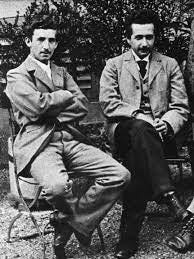The Search for Genius
A framework for identifying brilliant individuals, teams, and accomplishments
Hey there! Welcome to the Rogue VC. Here, we explore the ideas, trends, and technology fueling the modern era. If you haven’t subscribed, join 100+ smart, curious folks by subscribing here:
How Can We Find Great People?
Regardless of your field, finding the best companies to work for, the best hires to make, or the most insightful mentors to learn from can significantly impact your path to success. But identifying these people is no trivial task.
We live in an era of unprecedented progress. While it used to be easy to point at accomplishments and say, “The person who did that is spectacular,” nowadays, things are a bit more confusing. Accomplishments are rarely the result of effort from a single person, and the characteristics of an outstanding team are often harder to place than those of a remarkable individual.
At its core, this perpetual quest in which we all participate is a search for genius. Not genius in the historical sense like Newton, Einstein, Edison, and Jung, but modern genius. People who have mastered their field, who pattern match as naturally as they breathe and as often. Individuals with the presence and gravitas to make real change in the world.
So, how can we identify these modern geniuses? What characteristics define them? And how might we cultivate these characteristics in ourselves?
What follows is a framework for understanding and recognizing genius in the individuals, teams, and accomplishments all around us.
Let’s dive in.
Genius has been defined in a variety of ways throughout the years. Some consider it “the extraordinary ability to apply creativity and imaginative thinking to almost any situation,” or, as Thomas Carlyle famously stated, genius is “an infinite capacity for taking pains.”
These descriptions encompass some aspects of modern genius, but I believe they fail to capture the idea fully. But I’m already getting ahead of myself. First, let’s take a quick pit stop to understand why it’s so difficult to identify great things.
The Upward Spiral
Human ability is ever-increasing. Each year, we see new records set, new technology pushed, and new limits explored. This progression is present in all fields and probably seems obvious. Making the impossible possible is something we’ve grown to expect.
It’s a part of our nature.
But within this never-ending vortex of progress, our ability to distinguish noteworthy accomplishments from simple progress fails. The world is too big, knowledge is too vast, and there are too many things to focus on. Take one look at recent intellectual accomplishments, and you’ll see what I mean. In the past few years:
Fusion reactors achieved net energy gain, potentially paving the way for infinite and abundant energy.
He Jiankui announced the first genetically edited baby, a huge step in eliminating debilitating genetic diseases like cystic fibrosis, sickle cell anemia, and Huntington's disease.
A stem-cell lab announced the successful growth of human kidneys, representing a potential solution to the chronic shortage of organ donors.
These things all seem like incredible steps towards a brighter future. But just how big are they?
With net energy gain achieved, how close are we to truly abundant energy? Will we have it next year? In five years? Ten? What other roadblocks stand in the way?
Is a genetically edited baby really a huge step toward curing genetic diseases? Or is it much easier to isolate and adjust the gene for hair color than to do the same for the same for sickle cell anemia?
What about kidney growth? Growing a human kidney sounds awesome, but how many can we feasibly grow at scale? Can they be transported or stored in the same way as natural kidneys? Or are there further complications that we’d only find upon deeper research in this field?
The truth is, without deep research in each of these areas, it's impossible to gauge the impact of these accomplishments. My opinion, uninformed by expertise in these fields, is essentially moot.
This same phenomenon is present in people. To determine whether a developer is incredible or average, I’d likely need to be a developer myself. To understand whether a scientist is working on work-class problems or simply solving equations for the sake of solving them, I’d have to be immersed in her field.
However, unlike accomplishments, people are multifaceted. There is far more to a person than the field in which they work. People have ambitions, motivations, biases, and habits — all things in which I have an abundance of context. While I might struggle to distinguish between the work of an average physicist and Einstein's theories, distinguishing the differences in their minds is a much easier task. That’s what we’ll tackle next.
The Characteristics of Genius
Obsession
The first and perhaps most important characteristic of a great mind is obsession. In his essay on genius, Paul Graham articulates this concept brilliantly. He writes:
The paths that lead to new ideas tend to look unpromising. If they looked promising, other people would already have explored them. How do the people who do great work discover these paths that others overlook? The popular story is that they simply have better vision: because they're so talented, they see paths that others miss. But if you look at the way great discoveries are made, that's not what happens. Darwin didn't pay closer attention to individual species than other people because he saw that this would lead to great discoveries, and they didn't. He was just really, really interested in such things.
Darwin couldn't turn it off. Neither could Ramanujan. They didn't discover the hidden paths that they did because they seemed promising, but because they couldn't help it. That's what allowed them to follow paths that someone who was merely ambitious would have ignored.
When a person follows an obsession, they naturally exhibit many of the characteristics we typically associate with greatness — drive, dedication, perseverance, and creativity. In the throes of obsession, the question of consistent effort is moot. Good results don’t matter. The obsession itself is the reward and the motivation.
Consider Isaac Newton, who is world-renowned for his revolutionary work in physics. His contributions fundamentally changed our understanding of motion and gravity, laying the foundation for modern science as we know it today.
However, what often surprises people is that Newton's intellectual pursuits stretched far beyond physics. In fact, he devoted a significant portion of his time to alchemy and religious studies. In a similar sentiment to Graham, I don’t believe these were calculated moves toward fame or recognition. Instead, they were manifestations of Newton's insatiable curiosity — areas that captivated his mind in a way he couldn’t possibly ignore. Like Darwin with his beetles or Ramanujan with his equations, Newton simply followed the trail of his fascinations wherever they led.
This perspective also sheds light on the creative aspect of genius. While creativity can spring from many sources, one such source is obsession. After all, when one spends all their time immersed in a field, it’s only natural they’ll come up with solutions others couldn’t. Using this lens, we can also reframe the concept of failure. To the obsessed mind, failures aren't painful setbacks, as Carlyle suggested. Instead, each attempt, each failure, is simply another opportunity to learn and dig deeper.
In our journey of identifying genius, obsession is a key piece of the puzzle. It is the fuel that pushes us to explore new ideas and untested waters. But, while I’m relatively confident genius cannot exist without obsession, obsession does not guarantee genius. Other characteristics must come into play to help channel it toward meaningful outcomes.
Systems Thinking
The second characteristic of a genius is systematic thinking. Through the constant creation and iteration of frameworks, great minds set themselves up to see patterns others may not. After all, luck favors the prepared mind, and no mind is more prepared than one with meticulously created frameworks to make sense of the world.
Take Ray Dalio, who gained widespread recognition after his firm, Bridgewater Associates, consistently outperformed the market for over two decades. However, it was the release of his book "Principles" that truly catapulted him to household name status. In "Principles," Dalio unveils the framework behind his success at Bridgewater by describing the utterly ridiculous number of systems he uses to make decisions. Dalio writes:
The more you think in systems and understand their interconnections, the better you will understand the big picture and the small details. Systematic thinking allows you to identify patterns and anticipate consequences, making you better prepared for whatever life throws at you.
In every aspect of his life, Dalio has a system. Need to determine which stocks to buy or sell? There’s a system for that. Need to hire or fire someone? Systems have you covered. Need to navigate a tough conversation in your marriage? Believe it or not, Dalio has a system for that as well.
Dalio has an obsession with systems, and for good reason. All things considered, they’ve treated him pretty well. And he’s not alone in this approach. Leonardo da Vinci’s interdisciplinary studies, Steve Jobs’ product development process, and Marie Curie’s research methodology all exemplify how integral systematic thinking is to great accomplishments.
But truly great minds don't stop at external systems; they also build systems within themselves. The process of reflection and self-awareness can be considered an internal system. It takes a systematic approach to look within oneself and recognize weaknesses and areas for improvement without bias. While most people react emotionally when confronted with their shortcomings, great minds use this information productively. Their internal systems allow them to look past their emotions and recognize when they may need to seek help or delegate tasks.
This brings us to an interesting point: Genius-level accomplishments are rarely created in isolation. More often than not, they require the help of an exceptional team. In other words, if someone is to accomplish something incredible, they must have a way to attract the right minds to their cause.
Magnetism
Albert Einstein is world-renowned for his theories of general and special relativity, but most people are unaware that these discoveries were not made on his own. Four years before he published “The Foundation of the General Theory of Relativity,” Einstein was obsessed with the idea that acceleration mimics gravity and inertia might be a gravitational effect. He discussed this idea with countless of the world’s best physicists, and in the process, he captured the mind of Marcel Grossmann. Grossmann was an expert in an area of physics known as tensor analysis, and their collaboration ended up being the key that unlocked general relativity.
Einstein, though not known for his charisma, possessed a certain magnetism that drew brilliant minds like Grossmann to him. This gravitas, or the ability to attract the right people to their cause, is the final characteristic of genius.
Today, this often manifests as storytelling. Elon Musk is an excellent example. Despite being a controversial figure, Musk's visions for the future and the narratives he's constructed around them have attracted some of the best and brightest minds in the world — not once, not twice, but three times with Tesla, SpaceX, and Neurolink. While Musk may not be the most technically proficient person in any of these companies, his ability to inspire and lead has been instrumental in their success.
Musk isn't alone in possessing this quality. Similar magnetic personalities were present in figures like Steve Jobs, whose ability to captivate audiences was legendary, or Greta Thunberg, who has mobilized millions worldwide with her passionate narrative on climate change. Through their storytelling, Jobs and Thunberg created movements around their obsession, achieving far more than they could have alone.
However, it's worth noting that magnetism can be a double-edged sword. On one hand, good storytelling can inspire, motivate, and gather support, allowing them to execute tasks in a way others can’t. On the other hand, it can create “cults of personality” that overshadow the actual work being done. Look no further than Adam Neumann and WeWork or Elizabeth Holmes and Theranos to see the results of magnetism gone wrong.
In essence, a genius's magnetism and storytelling act as a catalyst. Their ability to not just conceive but also communicate and rally others around big ideas sets them apart, transforming their ideas into movements and visions into reality.
Pulling it all together
What we're really looking at when discussing genius is a unique combination of traits. Obsession drives deep, relentless exploration of a subject. But without systems thinking, this exploration may be chaotic, yielding little of value. Systems thinking helps organize the labors of obsession, allowing patterns to emerge and creativity to flow. Yet even brilliant ideas often require collaboration to reach their full potential.
Importantly, this triad isn’t just additive—it's multiplicative. These characteristics play off each other, coming together to create a product worth more than the sum of its parts.
Here’s another thought: If genius-level accomplishments often require collaboration, then it's likely genius isn’t always embodied in a single individual. Perhaps sometimes it emerges from the collective efforts of a group, each member bringing their own flavor of obsession, systems thinking, or magnetism to the table. This "collective genius" might explain why some teams achieve far more than the sum of their parts would suggest.
In the end, recognizing genius – whether in individuals or groups – is as much an art as it is a science. But in the spirit of building systems, here’s a checklist I’ve built to help identify genius in those around us.
A Framework for Identifying Genius
When applying this framework, it's important to remember that not every genius will excel in all areas. The key is to look for a strong combination of these traits, whether in an individual or distributed across a group.
Obsession and Depth
Do they exhibit an intense, arguably unhealthy obsession with their field or problem?
Have they written on the topic?
How comprehensive is their knowledge of the history and current state of their field?
Systematic Thinking
Do they approach problems with clear, iterative frameworks?
Can they break down complex issues into manageable parts?
Do they show an ability to see patterns and connections others might miss?
Magnetism and Narrative
How compelling is their story or vision?
Can they inspire and motivate others to join their cause?
Do they have a track record of attracting top talent or resources?
Self-awareness and Complementary Skills
Are they aware of and upfront about their weaknesses?
How do they address or compensate for these weaknesses?
If it's a group, do the members' skills effectively complement each other?
Problem-Solving
Do they approach problems from unique angles?
Is there evidence of creative solutions or breakthrough thinking in their work?
Do they show a bias towards action and experimentation?
Impact and Recognition
Have they made noticeable contributions or advancements in their field?
Is their work recognized or adopted by others in the industry?
Are they pushing boundaries or challenging conventional wisdom?
As this is a VC-focused newsletter, I’ve also created a framework for identifying geniuses in startup founders and teams. You can find it below.
That’s all for today! Huge shoutouts to Jordan and Jake for their time and guidance on this piece. I hope you enjoyed it, and I’ll see ya next week :)
— Harrison
If you like my writing, you may be interested in some of my products and services!
Venture Insights: is a discovery platform for great content. If you enjoy the content I write, you’ll LOVE the content on VI. It’s filled with the best articles, tweets, and books focused on tech trends, entrepreneurship, VC, and personal development.
The Innovators Digest is your one-stop shop for the best of the internet. Every Tuesday at 9 am CST, we send you one great article, spotlight an awesome product or website, and inform you on one interesting internet trend - all in one digestible read. Subscribe here!
Break into VC: I do 1-on-1 consulting with people who want to break into VC. I’ll walk you through sourcing deals, diligencing startups, getting the attention of VCs, and everything in between. Book a free 15-minute consultation below.









